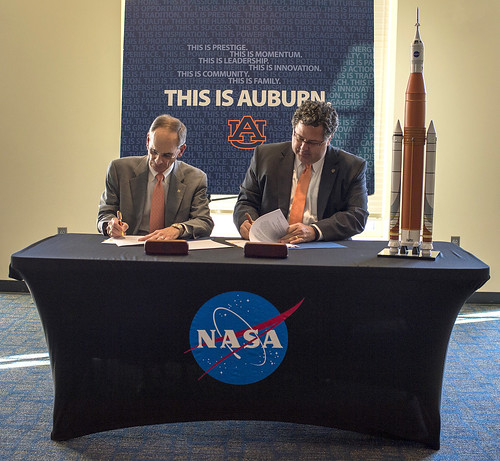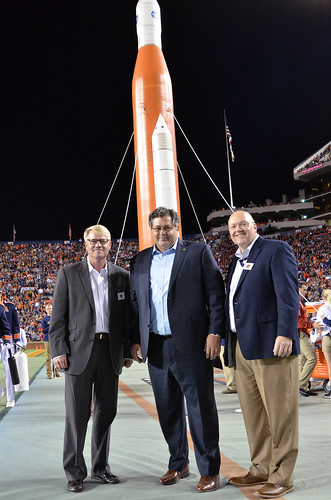Auburn University and NASA sign second Space Act Agreement, focus on wireless sensing
Article body
A Space Act Agreement was signed between Auburn University and NASA on Friday, Oct. 21, to collaborate on the development of wireless sensor and communication technologies. It is the second Space Act Agreement between the two organizations in the last 15 months.
John Mason, Auburn's vice president for research and economic development, signed the agreement with Todd May, director of NASA's Marshall Space Flight Center in Huntsville and a 1990 graduate of Auburn's Samuel Ginn College of Engineering.
Auburn and NASA will leverage each other's resources to further advance the understanding of wireless technology that can ultimately be used in space and avionics applications, such as the testing of NASA's new Space Launch System rocket, or the SLS.
Wireless communication networks have the ability to reduce payload size and weight due to no wiring and smaller power systems on board an aircraft.
"Small, light, energy efficient wireless technologies hold tremendous potential for spacecraft, in everything from the robotic explorers of distant planets to the powerful Space Launch System rocket that will launch human explorers to deep space and on to Mars," said May.
Rather than running miles of wires during the SLS testing phase, the sensors developed could allow NASA to remotely monitor the rocket's main fuel tank.
"Similar to Auburn's partnership with NASA last year to provide additive manufacturing expertise, this new agreement for wireless engineering capabilities will further leverage Auburn research to enhance current systems in space exploration," said Mason. "As the only university in the U.S. offering a degree program in wireless engineering, Auburn continues to be a leader in this field, and this connection with NASA reflects that."
Saturday's halftime show at the Auburn game against Arkansas honored May while celebrating the university's longtime history with NASA, which includes six astronaut alumni.
"We're excited by this opportunity to continue building our research partnerships with Auburn," said May.
Related Media
Media interested in this story can contact Communications Director Preston Sparks at (334) 844-9999 or preston.sparks@auburn.edu.
Auburn University is a nationally ranked land grant institution recognized for its commitment to world-class scholarship, interdisciplinary research with an elite, top-tier Carnegie R1 classification, life-changing outreach with Carnegie’s Community Engagement designation and an undergraduate education experience second to none. Auburn is home to more than 30,000 students, and its faculty and research partners collaborate to develop and deliver meaningful scholarship, science and technology-based advancements that meet pressing regional, national and global needs. Auburn’s commitment to active student engagement, professional success and public/private partnership drives a growing reputation for outreach and extension that delivers broad economic, health and societal impact.






